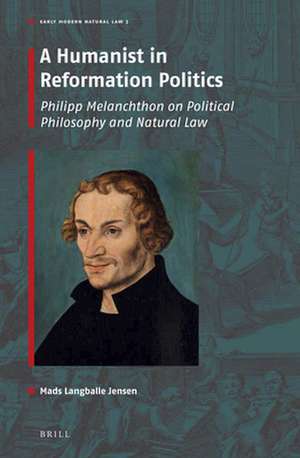A Humanist in Reformation Politics: Philipp Melanchthon on Political Philosophy and Natural Law: Early Modern Natural Law: Studies & Sources, cartea 3
Autor Mads L. Jensenen Limba Engleză Hardback – 6 noi 2019
Preț: 546.39 lei
Preț vechi: 666.33 lei
-18% Nou
Puncte Express: 820
Preț estimativ în valută:
104.58€ • 107.77$ • 88.29£
104.58€ • 107.77$ • 88.29£
Carte indisponibilă temporar
Doresc să fiu notificat când acest titlu va fi disponibil:
Se trimite...
Preluare comenzi: 021 569.72.76
Specificații
ISBN-13: 9789004412002
ISBN-10: 900441200X
Greutate: 0.48 kg
Editura: Brill
Colecția Brill
Seria Early Modern Natural Law: Studies & Sources
ISBN-10: 900441200X
Greutate: 0.48 kg
Editura: Brill
Colecția Brill
Seria Early Modern Natural Law: Studies & Sources
Cuprins
Preface: Melanchthon’s Natural Law as a Combative Concept
Acknowledgements
Introduction: Melanchthon, Political Philosopher of the Protestant Reformation
1 Melanchthon and the Political thought of the Protestant Reformation
2 Melanchthon: a Humanist in the Reformation
3 Protestant Wittenberg in Imperial Politics
1 Sedition, Tyranny, and Law in the Early 1520s
1 The Wittenberg Movement and the Split with Karlstadt
2 Melanchthon’s Humanist Conception of Politics
3 Melanchthon’s Early Ciceronian Political Thought
4 Humanists on Law
5 Melanchthon’s Oratio De Legibus
6 Conclusion: Melanchthon’s Distinctiveness
2 “The Causes That Lead Us to Institute Government and Obey Rulers”
1 Melanchthon’s Turn to Aristotle’s Moral Philosophy: the 1529 Commentary on the Nicomachean Ethics
2 The Identifiable Targets of Melanchthon’s Politics
3 Ockhamists and Radical Preachers: “Imperium Ex Consensu Populi”
4 Rebelling Peasants and Radical Preachers
5 Melanchthon’s Reassessment: Aristotelian Natural Law, State and Government
6 Property
7 Forms of Kingship
8 Wycliffe
9 Justice and Rule Limited by Law
10 Conclusion
3 A True and Learned Philosophy according to the Law of God
1 Cura Religionis, Tertius Usus Legis, and the Law of Nature in the 1530s
2 Natural Law and the Decalogue in the Philosophiae Moralis Epitome
3 Political Authority as a Divine Ordination
4 Justice and the Best Order of the State
5 Divine Law, Natural Law, the Law of Nations, and Positive Law
6 The Limits on Political Power
7 Conclusion
4 Liberty, Tyranny, and Defence of the True Religion
1 Resistance and Defence, or Rebellion?
2 The Schmalkaldic War: Political Legitimacy and the True Christian Faith
3 Melanchthon’s Editing of Von der Notwehr Unterricht
4 Melanchthon’s Philosophical Theory of Resistance in the nuii
5 The Magdeburg Confession
6 Conclusion
Conclusion: Melanchthonian Moral Philosophy and the Beginnings of Protestant Natural Law
Bibliography
Subject Index
Name Index
Acknowledgements
Introduction: Melanchthon, Political Philosopher of the Protestant Reformation
1 Melanchthon and the Political thought of the Protestant Reformation
2 Melanchthon: a Humanist in the Reformation
3 Protestant Wittenberg in Imperial Politics
1 Sedition, Tyranny, and Law in the Early 1520s
1 The Wittenberg Movement and the Split with Karlstadt
2 Melanchthon’s Humanist Conception of Politics
3 Melanchthon’s Early Ciceronian Political Thought
4 Humanists on Law
5 Melanchthon’s Oratio De Legibus
6 Conclusion: Melanchthon’s Distinctiveness
2 “The Causes That Lead Us to Institute Government and Obey Rulers”
1 Melanchthon’s Turn to Aristotle’s Moral Philosophy: the 1529 Commentary on the Nicomachean Ethics
2 The Identifiable Targets of Melanchthon’s Politics
3 Ockhamists and Radical Preachers: “Imperium Ex Consensu Populi”
4 Rebelling Peasants and Radical Preachers
5 Melanchthon’s Reassessment: Aristotelian Natural Law, State and Government
6 Property
7 Forms of Kingship
8 Wycliffe
9 Justice and Rule Limited by Law
10 Conclusion
3 A True and Learned Philosophy according to the Law of God
1 Cura Religionis, Tertius Usus Legis, and the Law of Nature in the 1530s
2 Natural Law and the Decalogue in the Philosophiae Moralis Epitome
3 Political Authority as a Divine Ordination
4 Justice and the Best Order of the State
5 Divine Law, Natural Law, the Law of Nations, and Positive Law
6 The Limits on Political Power
7 Conclusion
4 Liberty, Tyranny, and Defence of the True Religion
1 Resistance and Defence, or Rebellion?
2 The Schmalkaldic War: Political Legitimacy and the True Christian Faith
3 Melanchthon’s Editing of Von der Notwehr Unterricht
4 Melanchthon’s Philosophical Theory of Resistance in the nuii
5 The Magdeburg Confession
6 Conclusion
Conclusion: Melanchthonian Moral Philosophy and the Beginnings of Protestant Natural Law
Bibliography
Subject Index
Name Index
Notă biografică
Mads Langballe Jensen, Ph.D. (2014), University College London, is post-doctoral research assistant at Royal Holloway University of London. He has published on Protestant political thought from the Reformation to the early eighteenth century. This is his first book.
Recenzii
"[...] wird er neut deutlich, dass ihm eine sorgfältig gearbeitete, stringent argumentierende Studie gelungen ist, die zugleich quellennah vorgeht und Melanchthons Thesen in überzeu gender Weise sowohl in zeitgenössische Debatten wie in politische Konflikte einordnet". Jan-Hendryk de Boer, in Zeitschrift für Historische Forschung, 48 (2021), pp. 149-151.





